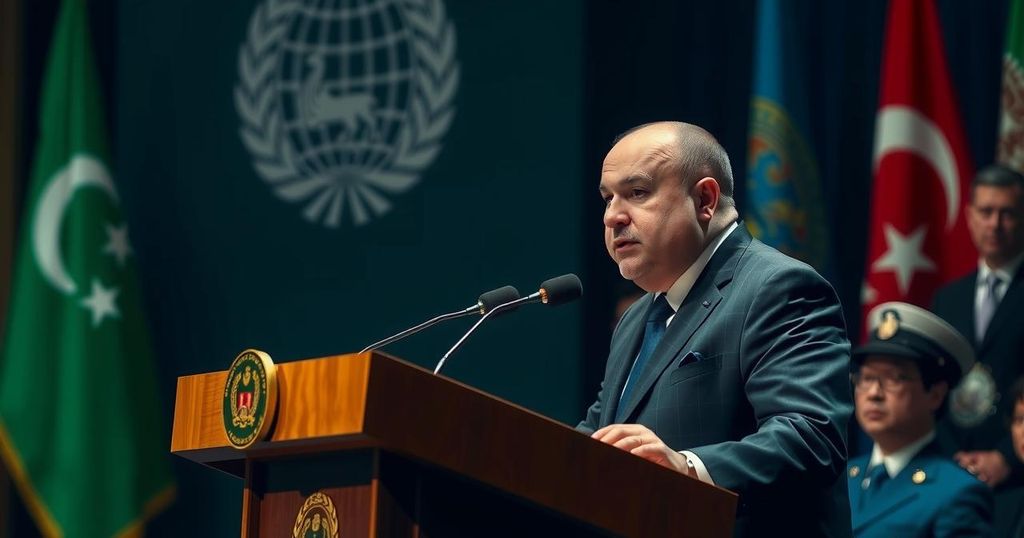COP29 in Baku, led by President Ilham Aliyev, has faced criticism for his confrontational speeches against Western nations and staunch advocacy for fossil fuels. Tensions escalated with European diplomats in response to Aliyev’s inflammatory remarks, particularly targeting France and the Netherlands for neocolonial practices. This has raised serious concerns regarding Azerbaijan’s dedication to climate goals, amid allegations of greenwashing and ongoing human rights abuses.
The recent COP29 climate talks in Baku, hosted by Azerbaijan’s President Ilham Aliyev, have been marked by significant controversy due to his aggressive rhetoric and overt support for fossil fuels. Aliyev’s opening speech included strong criticisms of Western nations, depicting them as hypocritical, particularly targeting France and the Netherlands for their colonial legacies. His confrontational approach has led to tensions with European diplomats and raised doubts about Azerbaijan’s true commitment to climate action. Amidst claims of Azerbaijan using the summit for political maneuvering, Aliyev simultaneously showcased the country’s fossil fuel projects, which has further fueled skepticism about the sincerity of its climate objectives.
As the COP29 conference unfolded, President Aliyev’s remarks took an unexpected turn, leading to outrage among European officials. He alleged that France and the Netherlands were engaging in neocolonial suppression, referencing several overseas territories during a leaders’ summit. His accusations escalated diplomatic tensions, prompting the French Foreign Ministry to summon the Azerbaijani ambassador, while Azerbaijan retaliated by summoning the French ambassador. Such exchanges highlight the deteriorating relationships and suggest that Azerbaijan may be prioritizing political disputes over collaborative climate initiatives. EU officials expressed concern that Aliyev’s inflammatory comments could jeopardize progress at the conference, particularly as he champions fossil fuel interests.
Aliyev’s approach at COP29 raises intricate questions about Azerbaijan’s environmental commitments. The country, heavily dependent on fossil fuels, is under scrutiny for using the conference as a platform for greenwashing. During the talks, Aliyev referred to oil and gas production as a “gift from God,” further asserting that Azerbaijan should not be criticized for its energy policies. Statements from Azerbaijani representatives about potential gas deals have led to skepticism regarding genuine efforts to reduce emissions. Additionally, allegations regarding human rights abuses within Azerbaijan, including the repression of dissent, complicate the nation’s international image and underline the contrast between its political rhetoric and climate commitments.
At the heart of the controversy lies Aliyev’s increasingly anti-colonial rhetoric aimed at France, especially following Azerbaijan’s military actions in Nagorno-Karabakh. This shift reflects broader geopolitical strategies, with Azerbaijan seeking to position itself as a champion of decolonization while simultaneously courting backers in the fossil fuel sector. Such actions raise critical ethical dimensions about the integrity of Azerbaijan’s leadership in climate discussions. Moreover, the background context of systemic human rights violations only amplifies the challenges Azerbaijan faces in asserting a credible role in global climate negotiations.
The article highlights the shifting political landscape during COP29, where rhetoric often overshadows substance. President Aliyev’s remarks and Azerbaijan’s fossil fuel advocacy reflect a complicated intersection of energy interests and climate concerns, complicating the prospects for meaningful dialogue. As Azerbaijan navigates its position within international climate politics, the resulting tensions serve as a reminder of the intricate power dynamics that shape environmental discussions on a global scale.
The COP29 climate talks, held in Baku, Azerbaijan, have become a focal point of international scrutiny following President Ilham Aliyev’s controversial rhetoric. As one of the world’s leading fossil fuel producers, Azerbaijan’s positioning during these discussions raises questions regarding the authenticity of its commitment to climate action. The intersection of geopolitical tensions, particularly with the West, and domestic human rights concerns have further complicated Azerbaijan’s image on the global stage. This backdrop sets the stage for understanding the implications of Aliyev’s statements and the broader context of COP29.
In conclusion, President Ilham Aliyev’s confrontational rhetoric at COP29 has sparked significant controversy, drawing attention away from critical climate issues and raising doubts about Azerbaijan’s commitment to environmental progress. The accusations leveled against Western nations reflect a shifting political landscape that prioritizes national interests over collaborative climate action. Amid ongoing concerns regarding human rights abuses and the country’s fossil fuel dependence, Azerbaijan’s role in the global climate arena remains fraught with contradictions and skepticism about its sincerity in achieving meaningful climate outcomes.
Original Source: www.euractiv.com






